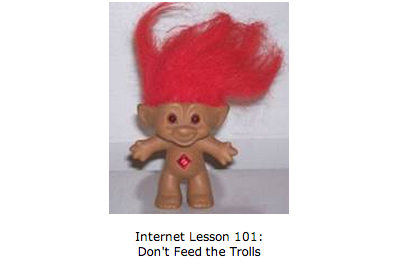The Constitution Protects Trolls - But You Don't Have to Feed Them
Page Media

Late last week, Gawker's Adrian Chen "unmasked" Violentacrez, a notorious "troll" on the content aggregator Reddit. Violentacrez is a remarkably unsympathetic figure; as the article put it, his "specialty is distributing images of scantily-clad underage girls," and he "also issued an unending fountain of racism, porn, gore, misogyny, incest, and exotic abominations yet unnamed." Yet while the story and Violentacrez' subsequent decision to delete his Reddit account drew cheers from some, it also prompted at least one group of Reddit editors to ban Gawker content in retaliation and sparked a broader conversation about the role of free speech, anonymity, and privacy online, with plenty of outrage on all sides.
So what can we take from all of this?
First, Violentacrez's actions may have been crude and disgusting, but that doesn't mean that the right to free speech[*] does not apply to him. In fact, if our commitment to freedom of speech is to mean anything, it must include defending speech that we find obnoxious and offensive. That's precisely why the ACLU defended the Nazi Party's right to march in Skokie, Ill. It would be difficult to find a group whose beliefs were more diametrically opposed to those of the ACLU—but we recognized that defending the principle of free speech meant taking up the mantle even to defend the right to say things that we found hateful and wrong.
Not that we are the first to recognize that, of course:
"I disapprove of what you say, but I will defend to the death your right to say it."
– Evelyn Beatrice Hall (describing Voltaire's attitude)
"If you're in favor of freedom of speech, that means you're in favor of freedom of speech precisely for views you despise."
– Noam Chomsky
The same goes for Violentacrez' right to privacy and anonymity. Anonymous speech has been an essential part of our nation's democratic history, from Publius of the Federalist Papers to our modern online dialogue. Denying Violentacrez the right to speak anonymously because he offends us makes it harder to claim that right for others whose views on sexuality, religion, or other topics might cause offense to some as well.
None of this is to say that anyone who finds a picture of herself online should be without recourse—she may well have the right to have it removed. But that's very different from concluding that Violentacrez has somehow lost his right to free speech and anonymity by pursuing activities that could be described as "icky but legal."
So if Violentacrez has a right to anonymous speech, does it follow that Chen was wrong to unmask him? Not necessarily. In this case, it appears that Chen was able to out Violentacrez through old-fashioned investigative journalism: he chased a lead, found a source, and turned it into a story. While Violenacrez may have the right to refuse to identify himself, that doesn't necessarily mean that he has the right to prevent anyone else from doing the same.
On the other hand, how would we feel if Reddit itself (rather than a volunteer moderator) had outed Violentacrez, or had made it easy for Chen to use technology to do so? If Google and Facebook decided to put their immense data repositories together and try to uncover his identity? Or if the government had pressured Reddit or Google or anyone else to unmask Violentacrez—not because he had committed a crime but simply because they didn't like what he said? (How much of a step is it from the authority to uncover Violentacrez' identity because he's obnoxious to the authority to unmask political critics on Twitter based on questionable allegations of libel?)
The Internet can make anonymity seem easy to achieve—but it also opens up new ways to pierce that shield. We need to continue to figure out who should have that power and how it can be appropriately balanced with the rights of the individual.
We are just starting a much-needed discussion on how to interact with each other online, including the role of the media and companies like Reddit. Outrage and angry responses (targeted at everyone involved: Violenacrez, Reddit, Chen, and Gawker) may be easy to do thanks in no small part to the convenience and, yes, anonymity of the Internet, but they don't always solve the problem.
This discussion needs to start with the recognition that the fundamental rights to privacy and free speech apply to everyone, including—maybe even especially—those who say and do "icky but legal" things. Drawing the line to exclude someone like Violentacrez weakens the protections for everyone.
And last but not least, the best response to speech may usually be more speech, but there is one major exception to that rule: don't feed the trolls. The Violentacrez of the world thrive on attention, and expressing outrage about their behavior is just giving them what they want. Ignoring them, rather than trying to shout them down or take away their rights, is the best solution.
Chris Conley is the Technology and Civil Liberties Fellow with the ACLU of Northern California.
[*] (added 10/17): The First Amendment only states that "Congress shall pass no law ... abridging the freedom of speech"; as others have noted, it does not mean that Reddit was somehow required to let Violentacrez say or do anything he likes. But that doesn't mean that this story is somehow not about free speech. Free speech is a principle, and if our technology is set up so that intermediaries like Reddit can and do effectively decide what we can and can't say, then our public forum is weakened without the government raising a finger.
